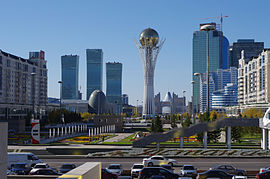President Atambayev Visits Kazakhstan
By Arslan Sabyrbekov (04/02/2014 issue of the CACI Analyst)
On March 26, Kyrgyzstan’s President Almazbek Atambayev paid a one day visit to Kazakhstan. The sides used this meeting to discuss ways of further strengthening bilateral relations and ways to cooperate in the framework of integration processes taking place in Eurasia.
The meeting took place in Almaty, Kazakhstan’s largest and financially strongest city. The heads of the two states discussed a number of issues of bilateral concern, including trade, investment, water and energy, as well as aspects of cultural and humanitarian cooperation. Both presidents put special emphasis on the activities of the joint Kazakh-Kyrgyz Investment Fund, created in 2011 with the primary objective of assisting Kyrgyzstan in its economic development. Kazakhstan’s President Nursultan Nazarbayev stated that the “Kazakh-Kyrgyz Investment Fund plays one of the leading roles in enhancing bilateral economic relations and since its creation, Kazakhstan’s trade with Kyrgyzstan has increased by 41 percent, therefore exceeding one billion dollars.” President Nazarbayev also informed the delegates that over the course of Kyrgyzstan’s independence, Kazakh businessmen invested over one billion dollars into the economy of the neighboring state.
In turn, President Atambayev thanked his Kazakh colleague for his kind invitation, noting that Kazakhstan is a leading country in the region in terms of its impressive socio-economic development and its tremendously important contribution to ensuring regional peace and stability.
Local experts made different assumptions after Atambayev’s visit to Kazakhstan. Some believe that the visit took place on the request of the Russian Federation with the objective of accelerating Kyrgyzstan’s entry into the Customs Union and encourage it to fully join Kazakhstan in recognizing the recent referendum in the Crimean peninsula as legitimate.
According to Guljigit Isakov, Director of the Bishkek based NGO Fair Elections, “in terms of its foreign policy towards Kyrgyzstan, Russia delivers its messages through Astana, which for example remains to be the case regarding Bishkek’s entry into the Customs Union under preferable terms.” Isakov added that the meeting might have focused on Bishkek’s two diverging positions on the situation in Ukraine, where it first officially recognized the current Ukrainian political leadership and also recently made a surprising statement that the referendum in Crimea was legal and demonstrates the peoples’ democratic choice, unlike Astana which fully supports Moscow’s position over the Ukrainian crisis. Isakov stated that Bishkek is on its way to losing sovereignty and might turn into a modern type colony.
Alikbek Djekshenkulov, Kyrgyzstan’s former Minister of Foreign Affairs and leader of the opposition political party Akyikat, has also strongly condemned Bishkek’s ambivalent position on Ukraine and called on the country’s leadership to pursue a stable and predictable foreign policy. According to Djekshenkulov, “in a globalized world and as a small country, Kyrgyzstan should conduct a multi-vector foreign policy and pursue its national interests.” Djekshenkulov justified Astana’s position on Ukraine as a preventive measure for preserving its territorial integrity and as yet another protection from Russian pressure, which can take place in the future.
Other local experts believe that the situation in Ukraine was not a major subject discussed during the meeting between the two presidents in Almaty. Azamat Akeleev, a Bishkek based civil activist and economist, expressed an unexpected point of view by suggesting that during the meeting President Nazarbayev could have called on his Kyrgyz counterpart to refrain from joining the Russia-led Customs Union. Akeleev believes that “President Nazarbayev wants to find a common position with Kyrgyzstan since the next project of the Russian Federation after the Customs Union is the establishment of a free economic zone. This project is alarming to Kazakhstan since it will severely undermine the country’s economic independence.” According to Akeleev, Astana is looking for options to diminish Moscow’s influence and pressure and has recently discussed Kazakhstan’s accession to the World Trade Organization with President Obama. Kazakhstan’s prospective WTO membership was also raised at the last G20 Summit in Saint Petersburg, where President Nazarbayev personally appealed to the heads of states and governments to support his country’s quick accession into the Organization.
Bishkek has already developed and submitted its terms to entry the Customs Union, which contains around four hundred preferences and is awaiting the next round of discussions.
CACI Analyst, March 19, 2014
The Cost of Black Tuesday for Kazakhstan
By Birgit Brauer (03/19/2014 issue of the CACI Analyst)
The devaluation of the Kazakh tenge on Feb. 11, dubbed Black Tuesday, has further eroded the little trust people have had in the National Bank of Kazakhstan and the country's financial system. The news came as an unpleasant surprise for many Kazakhstanis who had believed the repeated assurances of the National Bank that there would be no devaluation. Even western financial analysts, who had anticipated the move, were taken aback by the scale of the devaluation.

“CACI Analyst, March 05, 2014”
Assessing Kazakhstan's Revised National Development Strategy
By Richard Weitz (the 03/05/2014 of the CACI Analyst)
In his annual State of the Nation address on January 17, President Nursultan Nazarbayev reaffirmed the vision of stable economic development found in the Kazakhstan-2050 national development strategy, while adding important details and refinements. He and the Foreign Ministry have since clarified the international dimensions of the strategy. Nazarbayev and other experts acknowledge the economic and other challenges in transforming Kazakhstan into one of the world’s 30 most developed countries, but can point to Kazakhstan’s exceptional past performance as an indicator of its future potential.



